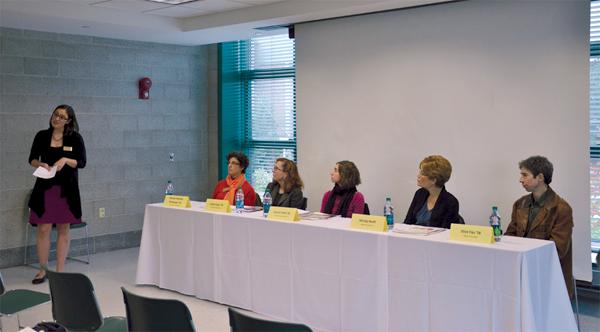
The Center for Civic Engagement (CCE) hosted a panel discussion titled “Whet Your Appetite” yesterday, which presented possible job positions in the food industry that advocate for health and environmental consciousness.
The panel discussion took place from 3 to 4:30 p.m. in New University Union room 324, in conjunction with a screening of the documentary “Food Inc.” to recognize yesterday’s national Food Day.
“Food Day is about food safety, sustainability and health,” said Christie Zwahlen, the community engagement coordinator of the CCE. “I think it’s a really important issue and I think that it’s something that people need to know about.”
Each panelist had experience working in the food industry and represented a different approach to improving the quality of the food people consume. The panelists’ careers ranged from dietitians to organic restaurant owners.
“We wanted to provide people with a variety of opinions because food is a contentious issue,” Zwahlen said.
During the discussion, panelists shared daily experiences that they felt would provide students with a glimpse into the demands of the food industry.
“I used to bake and sell whole wheat bagels,” said Eliot Filks ‘78, the owner of the Whole in the Wall restaurant in Binghamton. “I’d sell out in two hours and that helped fund my restaurant.”
Filks now makes an organic pesto sauce that sells in more than 120 stores in 29 states.
Cathy Lasser ’78, who worked as the chief technical officer for IBM in Vestal and has worked with major consumer companies such as Coke and Nestle, spoke extensively about the effects of technological advancements in producing healthier food.
“Many companies now conduct their own research, they’re taking in a lot of data,” Lasser said. “This new information has opened them up to new solutions.”
Lauren Tonti ’10, who co-founded the Binghamton Urban Farm Project — an organic farm located on Tudor Street dedicated to increasing the accessibility of healthy food to Binghamton residents — proposed a more localized, grass-roots solution to the negative affects of mass-producing food.
Tonti said the farm sells its organic food at a lower price than supermarkets do.
“It costs way more to transfer something than it does to produce,” Tonti said. “The average item at the supermarket has to travel 1,500 miles to get there.”
Smaller urban farms also provide farmers opportunities to use fewer chemicals, according to Tonti.
“If [farmers] are growing 20,000 acres of spinach, they have to expose the food to mass-amounts of chemicals,” Tonti said. “I’m growing food on a half an acre, we’re not using any chemicals.”
Anna Alcott, a junior majoring in history, said she attended the panel to explore employment options within the food industry.
“I’m having a bit of a career crisis,” Alcott said. “I’m definitely going to look into some of the non-profit organizations.”
At the end of the panel, all of the speakers agreed on the importance of healthy eating in today’s society, where obesity and diabetes are increasing rapidly.
“Food is the biggest environmental issue of our time,” Tonti said.


